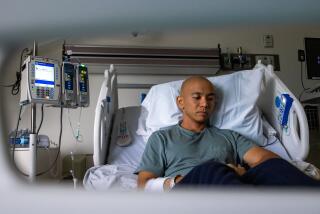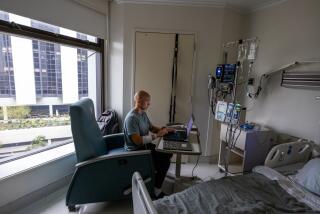O.C. Transplant Was Diplomatic Operation, Too
- Share via
SANTA ANA — Tuan Ta was his brother’s last hope.
The Catholic priest, 44, had the only matching kidney that 51-year-old Thien Ta needed to survive. The trouble was that the younger Ta was in Vietnam, while his ailing brother was in Santa Ana, and Washington and Hanoi do not have diplomatic relations.
But with the help of the Wisconsin-based U.S. Committee for Scientific Cooperation With Vietnam, Tuan Ta was allowed to fly here two weeks ago.
On Nov. 10, the brothers underwent a transplant at Western Medical Center-Santa Ana. Tuan Ta, who donated his left kidney, was discharged Tuesday. On Friday, the two gathered in Thien Ta’s hospital room to recount how they became the first two people in Orange County to require diplomatic intervention so one could donate a body organ to another.
“I am so moved by my brother’s love,” Thien Ta said quietly through tears. “He has given me a chance for life.”
Added Tuan Ta: “I was happy to give a part of myself to my brother. Another priest can always replace me. But if my brother dies, no other father can replace him to his children and no other husband can replace him to my sister-in-law.”
Thien Ta has been diabetic since his early 20s, but his kidneys did not begin to fail until six years ago. Because of the illness, he was forced to retire from his job as a computer technician. In recent weeks, doctors did not know how long he could survive.
In 1991, he started coming to Western Medical Center-Santa Ana three times weekly for kidney dialysis treatment, an artificial form of the cleansing process that healthy kidneys perform.
Thien Ta passed medical tests to qualify for a kidney transplant and was put on the waiting list for a kidney in April, 1992, said Dr. Garo M. Tertzakian, a transplant surgeon and director of the hospital’s renal transplant department.
Though the best chance for a matching kidney lies with a parent or sibling, Thien Ta’s sister and brother in Orange County did not qualify for medical reasons.
Doctors checked other relatives. But the kidneys of his wife, Thu Tran, were deemed a poor match. Thien Ta’s children--a 14-year-old daughter and a 12-year-old son--were considered too young to donate an organ.
“The family mentioned several months ago the brother in Vietnam,” Tertzakian said, and the race to bring Tuan Ta here was on.
Thien Ta’s wife, Thu Tran, who is coordinator of the immigration program for Catholic Charities of Orange County, first called federal agencies, where she was advised the paperwork could take a long time.
“Of course, I was frustrated to hear that,” she said. “My husband’s condition was getting worse. There was one week where I had to bring him into emergency three times.”
About 24,000 people nationwide wait for kidney donations annually, Tertzakian said. The wait usually is between 1 1/2 to three years. Nearly 10% die while waiting for a match.
Thu Tran was told to contact the U.S. Committee for Scientific Cooperation With Vietnam, formed in 1978 to swap scientists, doctors and academicians with the Southeast Asian country in a variety of programs.
“We knew we had to bring Tuan from Vietnam very quickly or his brother would die,” said the group’s chairwoman, Dr. Judith Ladinsky, in a telephone interview from Wisconsin.
The committee was no stranger to such requests.
Since 1985, the group has helped three patients who needed organ transplants from relatives in Vietnam, Ladinsky said. The first case was in Illinois and the other two were in Los Angeles.
Ladinsky arranged for Tuan Ta, who lives in mountainous Da Lat, to drive five hours south to Ho Chi Minh City to get his blood drawn. The sample was then flown to Bangkok, where doctors tested it and determined that Tuan Ta was a perfect match for his older brother.
The committee also sped his request for a visiting visa through labyrinthine bureaucratic channels, a task that began near the end of August and ended with Tuan Ta’s arrival here Nov. 4.
“The Communist government did not give me any trouble at all because this was a humanitarian issue,” Tuan Ta said. But completing the paperwork required by U.S. authorities caused most of the delay, he said.
On Nov. 4, the brothers were reunited for the first time since Thien Ta visited Vietnam three years ago.
Thien Ta, who taught history at a high school, had left South Vietnam in 1975, when the Communist government from the north won control. He did not see Tuan Ta again until his 1990 visit.
The trip is Tuan Ta’s first visit to the United States.
“I’ve been joking that I came to give him a kidney so I can see the United States,” Tuan Ta said with a grin Friday as he sat next to his brother.
Though he was discharged, Tuan Ta must stay in Santa Ana until Tertzakian says he is healthy enough for the trip home. He is expected to lead a normal life with one kidney.
Thien Ta may be able to return home today. He, too, is expected to regain normal kidney function but must take anti-rejection medication for the rest of his life.
“I feel no pain,” Thien Ta said incredulously. “Even when I first woke up from the operation, I felt alert and didn’t feel any pain, so I wasn’t sure if I had been operated on or not.”
“It’s true,” Thu Tran said. “He asked me three, four times.
“We can’t thank Dr. Ladinsky or the hospital staff enough. They saved my husband’s life.”
Though other patients have had donors come from other countries, the Ta case was the first in the county to overcome a lack of governmental recognition, Tertzakian said.
“I want people to realize that because of the shortage of organs, doctors are obliged to be creative and even do the impossible so that our patients won’t die,” he said. “In this case, we had to use diplomatic channels to get Tuan here as soon as possible.”
More to Read
Sign up for Essential California
The most important California stories and recommendations in your inbox every morning.
You may occasionally receive promotional content from the Los Angeles Times.













